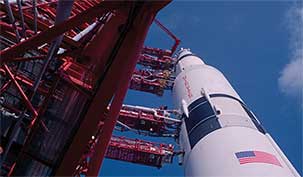What more can be said about the moon landing? Voraciously covered in July 1969, it has been dissected in impossible detail ever since and continues to stand as a landmark achievement in our shared history, a uniquely human endeavour beyond our planet. From its first shot, Apollo 11 makes clear that if nothing is left to say, let the events speak for themselves. As beautifully restored archival footage follows the astronauts and crew through their journey, your score emerges from the background to punctuate moments of tension, fear, and spectacle where words are not enough.
This score – and whole documentary – had the potential to be a mess. It’s easy to get swept up in just how grandiose the topic is. I mean, we went to the moon! In 1969! That’s insane! A key part of the composer’s job is elevating and underscoring the main emotions powering a scene and keeping the audience on that trajectory; your score could have been chock full of booming drums, driving synths, and soaring strings, coalescing in a glob which overshadows the human element by screaming “CAN YOU BELIEVE THIS?!?!” every step of the way.
However, it’s clear that you and regular collaborator Todd Douglas Miller were prepared for this possibility. No doubt thanks in part to your work on The Last Steps about Apollo 17, Apollo 11 is rooted in a clear guiding ideal: this requires no editorializing.
Matt, your score is great because of how much time I spend not listening to it. This might sound like a backhanded compliment, but it’s part of what elevates Apollo 11 from an enjoyable viewing to a thrilling cinematic experience. By largely reserving the score for moments of great tension or anxiety – such as the burning to land on the lunar surface or reattaching the lunar module – it takes on greater importance. In moments where the human actors are deep in their work, or perhaps simply do not yet know what to say, your music gives the moment a voice, synthesizers humming as the audience collectively holds its breath despite knowing what’s about to happen.
This patience implies a respect for the integrity of these crews and these people, and a conscious decision to not paper them over with pomp for another opportunity to pat the astronauts alone on the back.
The wealth of incredible archival footage and never-before-heard crew recordings leaves you at liberty to pick your shots, while the human element carries its own weight. I found a deep emotional attachment in being able to see crew chiefs in Houston speak to the astronauts rather than just a crackly radio; examining mission control, I was as captivated by a man smoking a pipe, or wearing a cast, as I was in Buzz Aldrin, Neil Armstrong, and Michael Collins. I wondered how they felt, or how they fit into all this, part of the “thousands and thousands of others” Collins mentions upon returning home.
You cleverly juxtapose this human element with an all-digital score – a closing credit reads, “All instruments and effects used in score existed at time of Apollo 11 mission.” In a video discussing the score’s creation, you sit dwarfed by a giant array of cables and knobs, switches and dials that brought this score together. It harkens back to the control rooms featured, and I wonder if, sitting before these machines, you felt a kinship with mission control, playing just the right notes to guide the audience on its parallel journey into the stars.
Listening to your score, I felt a similar kinship with the wowed masses of 1969. Despite its prominence, I didn’t know anything about the moon landing growing up – I took it for granted. Three men (though I always thought it was two – sorry Collins) went up and came back. I didn’t really get it. Thanks in no small part to your ominous, punchy synths humming in the background, while watching Apollo 11’s unadorned yet deeply effecting portrait of human ingenuity at work, I realized something…
I think I get it now.
Blasting off,
Corey






